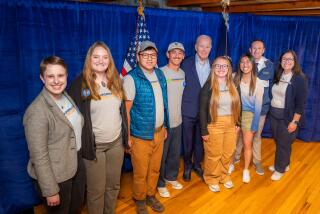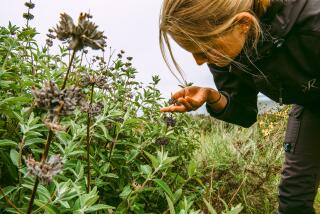Project Combines Work and Play : Earthwatch volunteers help protect the environment through study of nature and culture.
- Share via
Capturing caribou or kangaroos, studying the sex life of birds or baboons or digging for shark’s teeth in Montana are not your average mature traveler vacations.
But these and hundreds of other projects are offered each year by Earthwatch, a nonprofit international organization based in Watertown, Mass., that, since its founding in 1971, has sponsored and funded scientists and researchers to the tune of $20 million in funds and equipment to conduct almost 1,400 field projects in 111 countries. It has also provided more than 30,000 volunteers to staff the projects. Californians make up about 20% of all volunteers, the most of any state.
The majority of volunteers consist of travelers up to the age of 80. Earthwatch is the largest of the worldwide organizations sponsoring field research trips and educational expeditions. Others include the Alpine, Calif.-based Foundation for Field Research, The Costeau Society of Norfolk, Va., and Vancouver, B.C.-based Great Expectations, plus the programs offered by individual colleges and universities, such as the Research Expeditions Program at the University of California at Berkeley.
The fact that a participant’s costs are mostly tax-exempt is another reason, though probably not the deciding factor, why mature travelers would forsake a cruise or luxury resort stay to reside in rustic accommodations and share the cooking, dishwashing and other chores in addition to participating in a work project.
Most sign on to further their knowledge and enjoy the company of others in a unique environment. Most team members, incidentally, are singles rather than married couples.
You can choose to study whales, dolphins, sharks and all sorts of animal life--from the spotted owl in the Pacific Northwest to wild bison in Poland. You can participate in archeological projects ranging from excavating Mayan ruins in Mexico to legendary Carthage in Tunisia, or discovering more about fertility cults in Italy’s Pompeii.
There are diving projects, bird-watching, helping to plot better health care in Bolivia, Zimbabwe or Indonesia, working to preserve the culture of Australia’s Aborigines or helping find out what must be done to preserve the world’s rain forests in Mexico and Venezuela.
Destinations range from glacier study in Spitsbergen to studying bird habits in Australia’s Tasmania, plus other diverse studies in China, New Zealand, Madagascar, Sri Lanka and dozens of other countries and islands. There are a number offered in the United States, including several within California.
Teams of 10 to 20 volunteers sign up for two-week stints on research projects at costs ranging from $1,395 to $2,100. There is no single supplement. Frequently, there are several work periods for each project. And all of this is tax-deductible.
The price does not include transportation to and from the site. This can also be deductible, so long as the travel is not extended to include extra time or side trips for business or pleasure. Transportation can be arranged through Earthwatch.
All projects are described in Earthwatch’s bimonthly catalogue--not fully, but enough to give you an idea of what’s involved and whether it suits your interest and activity level.
No prior education is required, though most team members have attended college or have self-acquired expertise in various fields. All team members must have a doctor’s statement and recent health check.
Those who prefer less strenuous activity can usually find projects of interest, such as: studying sea grasses near the shores of the Bahamas; helping to study and map out an early castle in Pembrokeshire, Wales, or capturing on tape and video the Gaelic-inspired fiddlers of Canada’s Prince Edward Island to compare with tunes of 18th-Century Scotland.
Each project includes brief comment in the catalogue on “field conditions,” which gives an idea of the amount of physical work involved, such as hiking, climbing or “setting out each dawn with ecologist and armed game scout to look for rhinos.” Late sleepers might skip this one.
Information about sleeping accommodations and meals is also included. You can get a far more detailed briefing on any particular trip for $25, which is applied toward your deposit if you sign on.
Those who aren’t familiar with Earthwatch should write or call for more information and ask for the latest catalogue to get a better idea of the many projects offered and what’s involved.
For more information, contact Earthwatch, 680 Mount Auburn St., P.O. Box 403, Watertown, Mass. 02272. Or call (800) 776-0188, Monday through Friday between 8 a.m. and 6 p.m.
More to Read
Sign up for The Wild
We’ll help you find the best places to hike, bike and run, as well as the perfect silent spots for meditation and yoga.
You may occasionally receive promotional content from the Los Angeles Times.






